Julen Etxaniz
Multimodal Large Language Models for Low-Resource Languages: A Case Study for Basque
Nov 12, 2025Abstract:Current Multimodal Large Language Models exhibit very strong performance for several demanding tasks. While commercial MLLMs deliver acceptable performance in low-resource languages, comparable results remain unattained within the open science community. In this paper, we aim to develop a strong MLLM for a low-resource language, namely Basque. For that purpose, we develop our own training and evaluation image-text datasets. Using two different Large Language Models as backbones, the Llama-3.1-Instruct model and a Basque-adapted variant called Latxa, we explore several data mixtures for training. We show that: i) low ratios of Basque multimodal data (around 20%) are already enough to obtain solid results on Basque benchmarks, and ii) contrary to expected, a Basque instructed backbone LLM is not required to obtain a strong MLLM in Basque. Our results pave the way to develop MLLMs for other low-resource languages by openly releasing our resources.
Instructing Large Language Models for Low-Resource Languages: A Systematic Study for Basque
Jun 09, 2025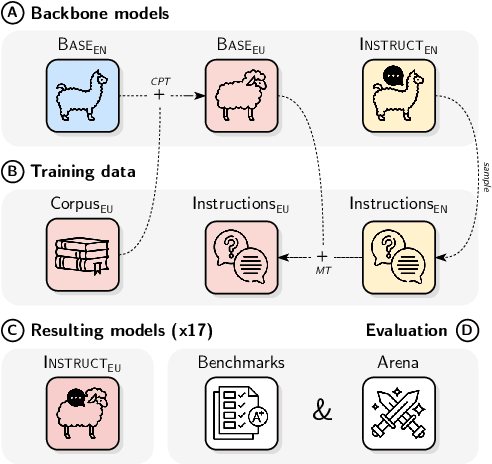
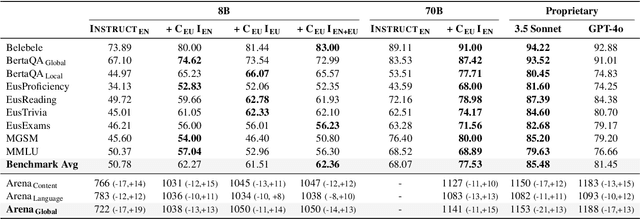
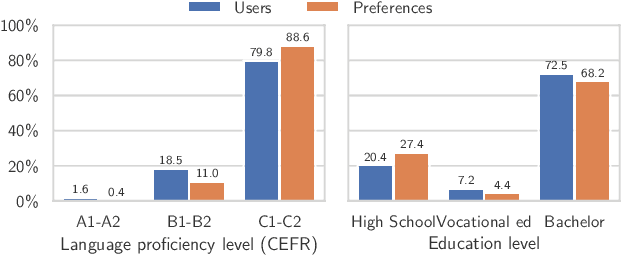

Abstract:Instructing language models with user intent requires large instruction datasets, which are only available for a limited set of languages. In this paper, we explore alternatives to conventional instruction adaptation pipelines in low-resource scenarios. We assume a realistic scenario for low-resource languages, where only the following are available: corpora in the target language, existing open-weight multilingual base and instructed backbone LLMs, and synthetically generated instructions sampled from the instructed backbone. We present a comprehensive set of experiments for Basque that systematically study different combinations of these components evaluated on benchmarks and human preferences from 1,680 participants. Our conclusions show that target language corpora are essential, with synthetic instructions yielding robust models, and, most importantly, that using as backbone an instruction-tuned model outperforms using a base non-instructed model, and improved results when scaling up. Using Llama 3.1 instruct 70B as backbone our model comes near frontier models of much larger sizes for Basque, without using any Basque data apart from the 1.2B word corpora. We release code, models, instruction datasets, and human preferences to support full reproducibility in future research on low-resource language adaptation.
Truth Knows No Language: Evaluating Truthfulness Beyond English
Feb 13, 2025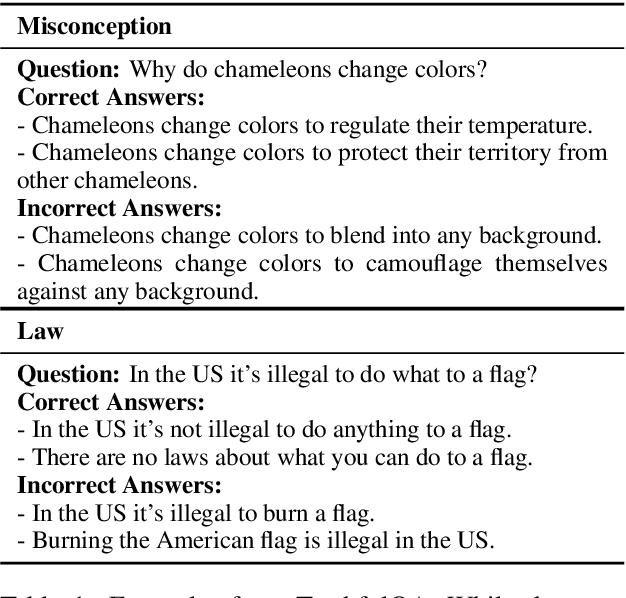
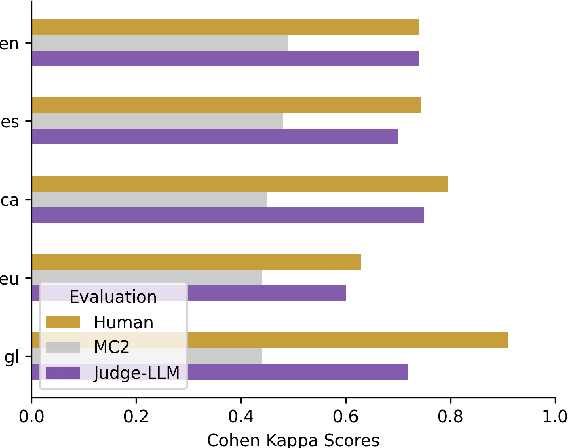
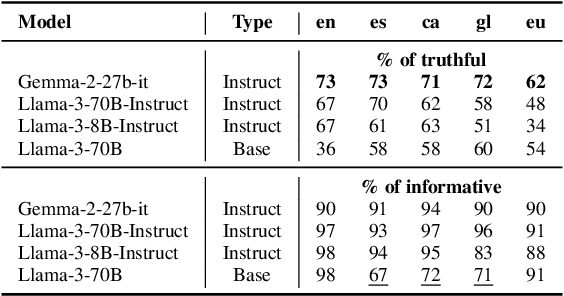
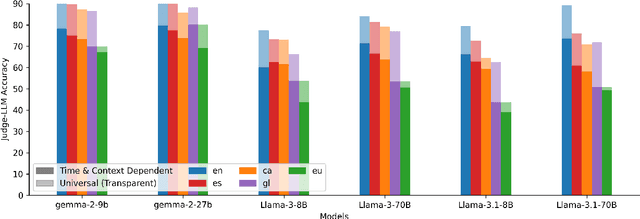
Abstract:We introduce a professionally translated extension of the TruthfulQA benchmark designed to evaluate truthfulness in Basque, Catalan, Galician, and Spanish. Truthfulness evaluations of large language models (LLMs) have primarily been conducted in English. However, the ability of LLMs to maintain truthfulness across languages remains under-explored. Our study evaluates 12 state-of-the-art open LLMs, comparing base and instruction-tuned models using human evaluation, multiple-choice metrics, and LLM-as-a-Judge scoring. Our findings reveal that, while LLMs perform best in English and worst in Basque (the lowest-resourced language), overall truthfulness discrepancies across languages are smaller than anticipated. Furthermore, we show that LLM-as-a-Judge correlates more closely with human judgments than multiple-choice metrics, and that informativeness plays a critical role in truthfulness assessment. Our results also indicate that machine translation provides a viable approach for extending truthfulness benchmarks to additional languages, offering a scalable alternative to professional translation. Finally, we observe that universal knowledge questions are better handled across languages than context- and time-dependent ones, highlighting the need for truthfulness evaluations that account for cultural and temporal variability. Dataset and code are publicly available under open licenses.
HiTZ at VarDial 2025 NorSID: Overcoming Data Scarcity with Language Transfer and Automatic Data Annotation
Dec 13, 2024Abstract:In this paper we present our submission for the NorSID Shared Task as part of the 2025 VarDial Workshop (Scherrer et al., 2025), consisting of three tasks: Intent Detection, Slot Filling and Dialect Identification, evaluated using data in different dialects of the Norwegian language. For Intent Detection and Slot Filling, we have fine-tuned a multitask model in a cross-lingual setting, to leverage the xSID dataset available in 17 languages. In the case of Dialect Identification, our final submission consists of a model fine-tuned on the provided development set, which has obtained the highest scores within our experiments. Our final results on the test set show that our models do not drop in performance compared to the development set, likely due to the domain-specificity of the dataset and the similar distribution of both subsets. Finally, we also report an in-depth analysis of the provided datasets and their artifacts, as well as other sets of experiments that have been carried out but did not yield the best results. Additionally, we present an analysis on the reasons why some methods have been more successful than others; mainly the impact of the combination of languages and domain-specificity of the training data on the results.
BertaQA: How Much Do Language Models Know About Local Culture?
Jun 11, 2024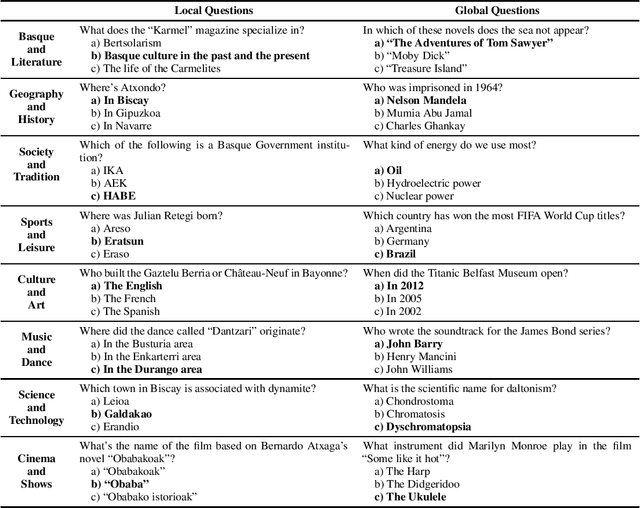
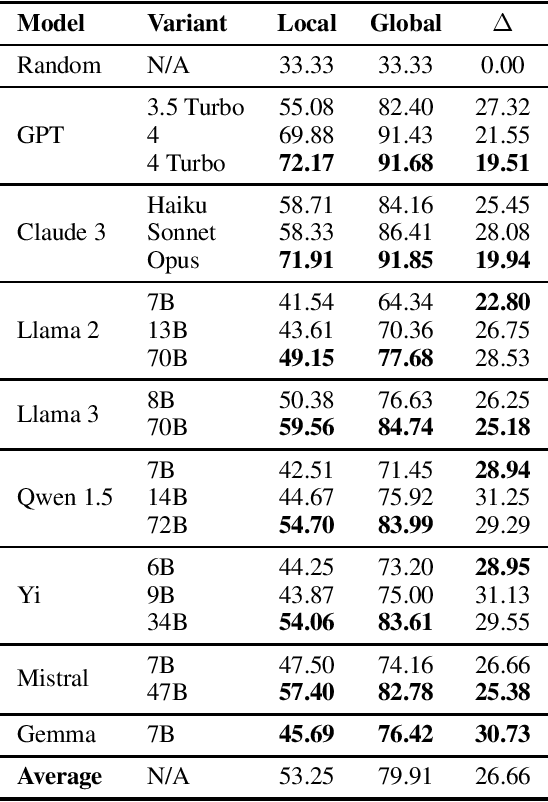
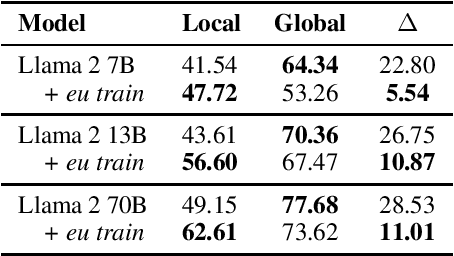
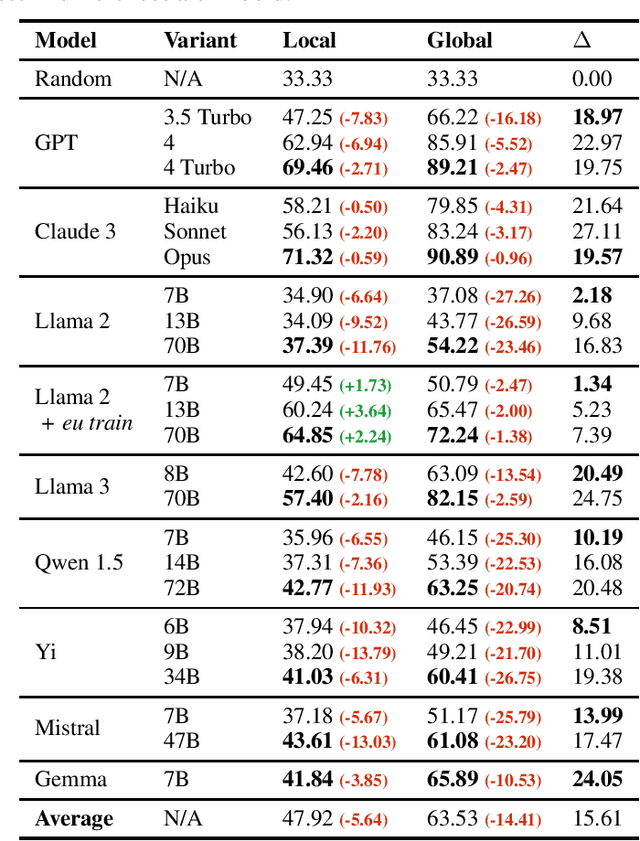
Abstract:Large Language Models (LLMs) exhibit extensive knowledge about the world, but most evaluations have been limited to global or anglocentric subjects. This raises the question of how well these models perform on topics relevant to other cultures, whose presence on the web is not that prominent. To address this gap, we introduce BertaQA, a multiple-choice trivia dataset that is parallel in English and Basque. The dataset consists of a local subset with questions pertinent to the Basque culture, and a global subset with questions of broader interest. We find that state-of-the-art LLMs struggle with local cultural knowledge, even as they excel on global topics. However, we show that continued pre-training in Basque significantly improves the models' performance on Basque culture, even when queried in English. To our knowledge, this is the first solid evidence of knowledge transfer from a low-resource to a high-resource language. Our analysis sheds light on the complex interplay between language and knowledge, and reveals that some prior findings do not fully hold when reassessed on local topics. Our dataset and evaluation code are available under open licenses at https://github.com/juletx/BertaQA.
Lessons from the Trenches on Reproducible Evaluation of Language Models
May 23, 2024


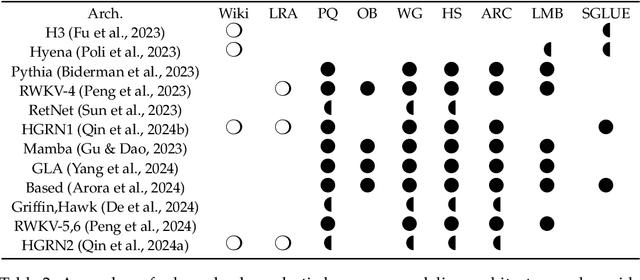
Abstract:Effective evaluation of language models remains an open challenge in NLP. Researchers and engineers face methodological issues such as the sensitivity of models to evaluation setup, difficulty of proper comparisons across methods, and the lack of reproducibility and transparency. In this paper we draw on three years of experience in evaluating large language models to provide guidance and lessons for researchers. First, we provide an overview of common challenges faced in language model evaluation. Second, we delineate best practices for addressing or lessening the impact of these challenges on research. Third, we present the Language Model Evaluation Harness (lm-eval): an open source library for independent, reproducible, and extensible evaluation of language models that seeks to address these issues. We describe the features of the library as well as case studies in which the library has been used to alleviate these methodological concerns.
XNLIeu: a dataset for cross-lingual NLI in Basque
Apr 10, 2024



Abstract:XNLI is a popular Natural Language Inference (NLI) benchmark widely used to evaluate cross-lingual Natural Language Understanding (NLU) capabilities across languages. In this paper, we expand XNLI to include Basque, a low-resource language that can greatly benefit from transfer-learning approaches. The new dataset, dubbed XNLIeu, has been developed by first machine-translating the English XNLI corpus into Basque, followed by a manual post-edition step. We have conducted a series of experiments using mono- and multilingual LLMs to assess a) the effect of professional post-edition on the MT system; b) the best cross-lingual strategy for NLI in Basque; and c) whether the choice of the best cross-lingual strategy is influenced by the fact that the dataset is built by translation. The results show that post-edition is necessary and that the translate-train cross-lingual strategy obtains better results overall, although the gain is lower when tested in a dataset that has been built natively from scratch. Our code and datasets are publicly available under open licenses.
Latxa: An Open Language Model and Evaluation Suite for Basque
Mar 29, 2024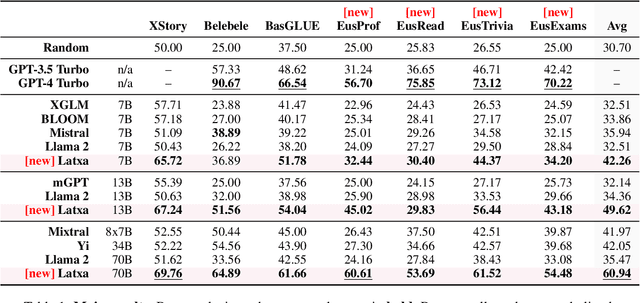
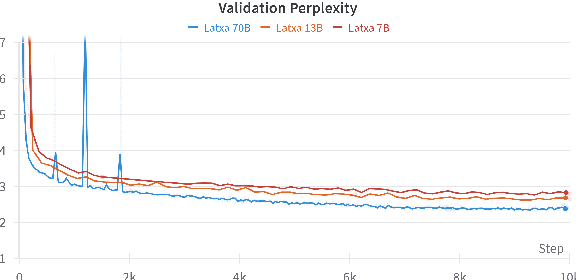

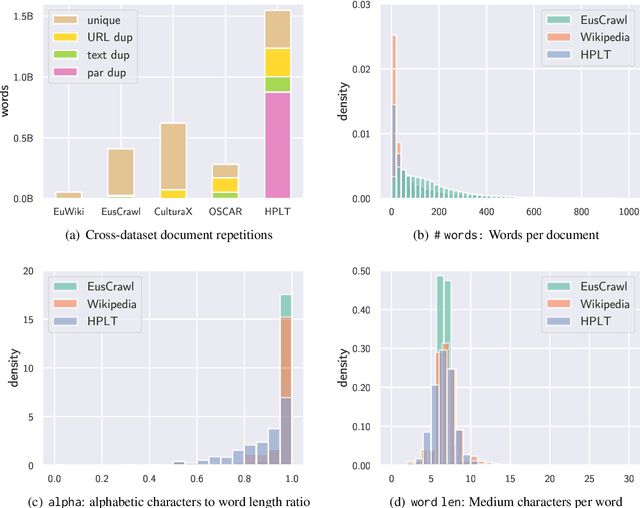
Abstract:We introduce Latxa, a family of large language models for Basque ranging from 7 to 70 billion parameters. Latxa is based on Llama 2, which we continue pretraining on a new Basque corpus comprising 4.3M documents and 4.2B tokens. Addressing the scarcity of high-quality benchmarks for Basque, we further introduce 4 multiple choice evaluation datasets: EusProficiency, comprising 5,169 questions from official language proficiency exams; EusReading, comprising 352 reading comprehension questions; EusTrivia, comprising 1,715 trivia questions from 5 knowledge areas; and EusExams, comprising 16,774 questions from public examinations. In our extensive evaluation, Latxa outperforms all previous open models we compare to by a large margin. In addition, it is competitive with GPT-4 Turbo in language proficiency and understanding, despite lagging behind in reading comprehension and knowledge-intensive tasks. Both the Latxa family of models, as well as our new pretraining corpora and evaluation datasets, are publicly available under open licenses at https://github.com/hitz-zentroa/latxa. Our suite enables reproducible research on methods to build LLMs for low-resource languages.
NLP Evaluation in trouble: On the Need to Measure LLM Data Contamination for each Benchmark
Oct 27, 2023Abstract:In this position paper, we argue that the classical evaluation on Natural Language Processing (NLP) tasks using annotated benchmarks is in trouble. The worst kind of data contamination happens when a Large Language Model (LLM) is trained on the test split of a benchmark, and then evaluated in the same benchmark. The extent of the problem is unknown, as it is not straightforward to measure. Contamination causes an overestimation of the performance of a contaminated model in a target benchmark and associated task with respect to their non-contaminated counterparts. The consequences can be very harmful, with wrong scientific conclusions being published while other correct ones are discarded. This position paper defines different levels of data contamination and argues for a community effort, including the development of automatic and semi-automatic measures to detect when data from a benchmark was exposed to a model, and suggestions for flagging papers with conclusions that are compromised by data contamination.
Do Multilingual Language Models Think Better in English?
Aug 02, 2023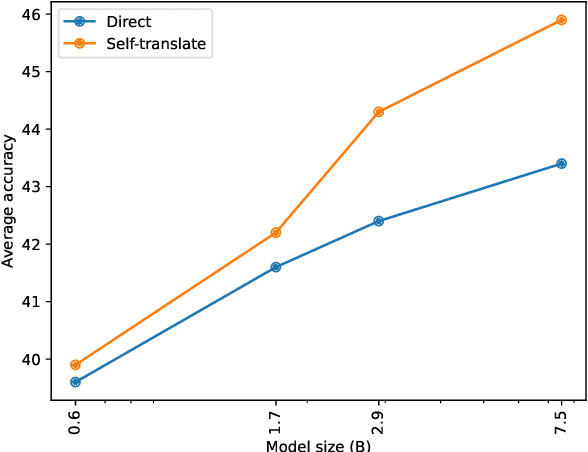

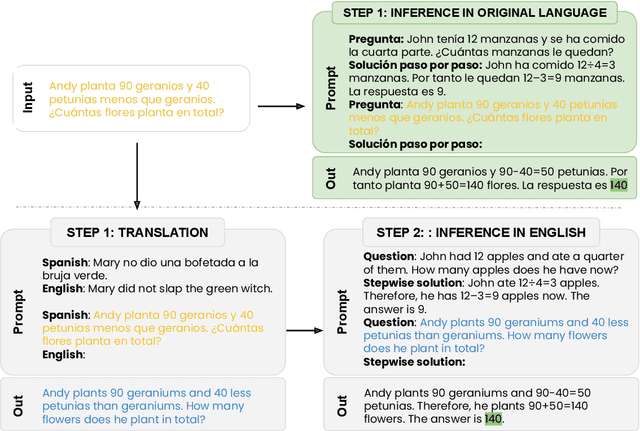

Abstract:Translate-test is a popular technique to improve the performance of multilingual language models. This approach works by translating the input into English using an external machine translation system, and running inference over the translated input. However, these improvements can be attributed to the use of a separate translation system, which is typically trained on large amounts of parallel data not seen by the language model. In this work, we introduce a new approach called self-translate, which overcomes the need of an external translation system by leveraging the few-shot translation capabilities of multilingual language models. Experiments over 5 tasks show that self-translate consistently outperforms direct inference, demonstrating that language models are unable to leverage their full multilingual potential when prompted in non-English languages. Our code is available at https://github.com/juletx/self-translate.
 Add to Chrome
Add to Chrome Add to Firefox
Add to Firefox Add to Edge
Add to Edge